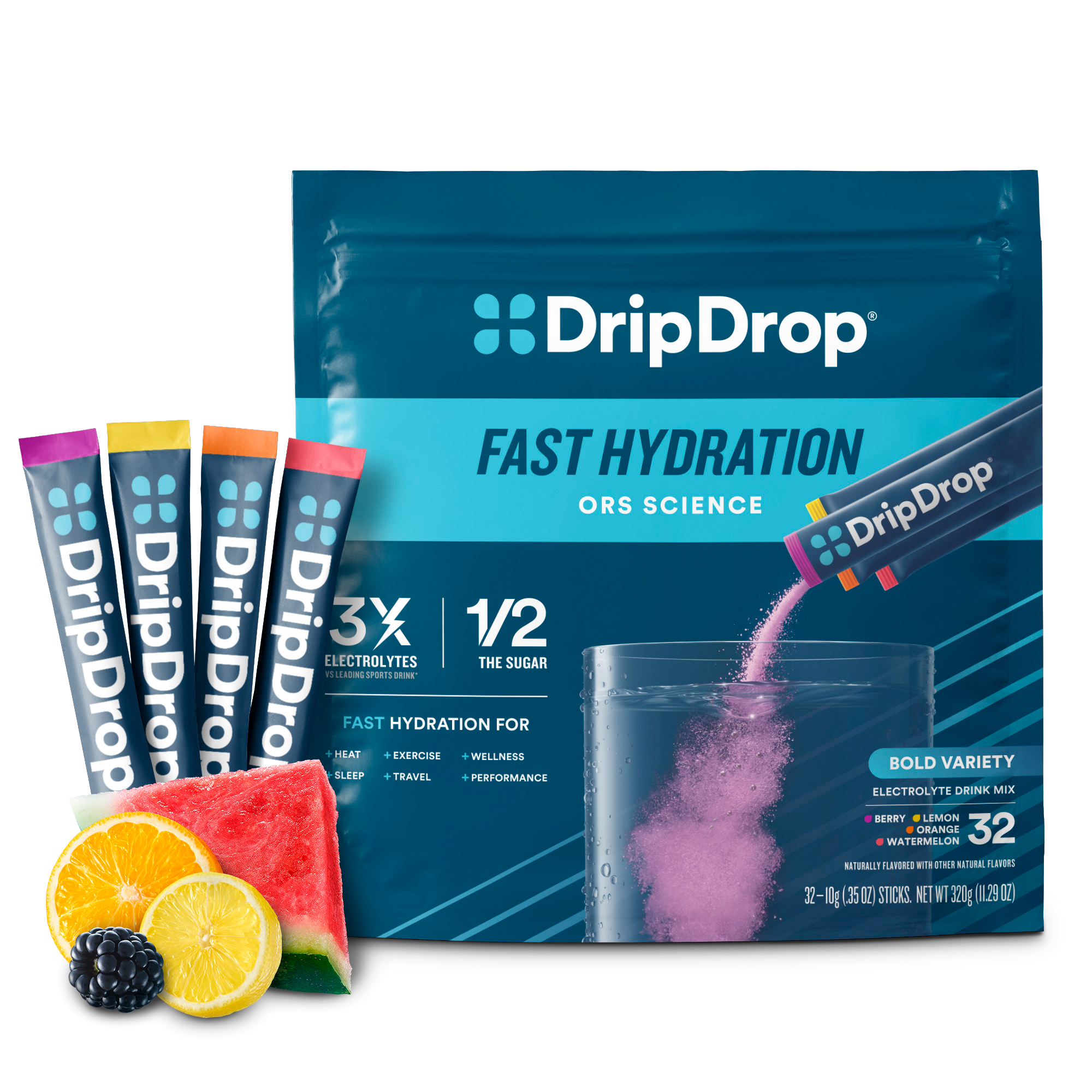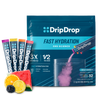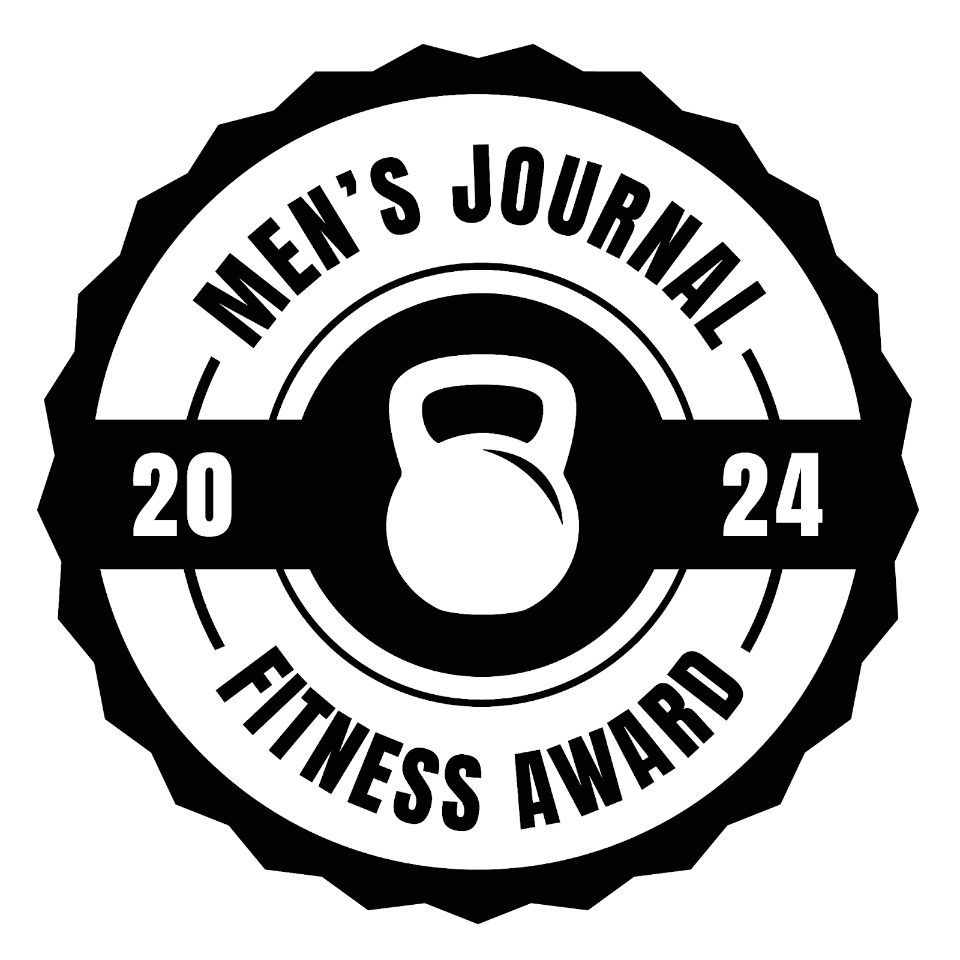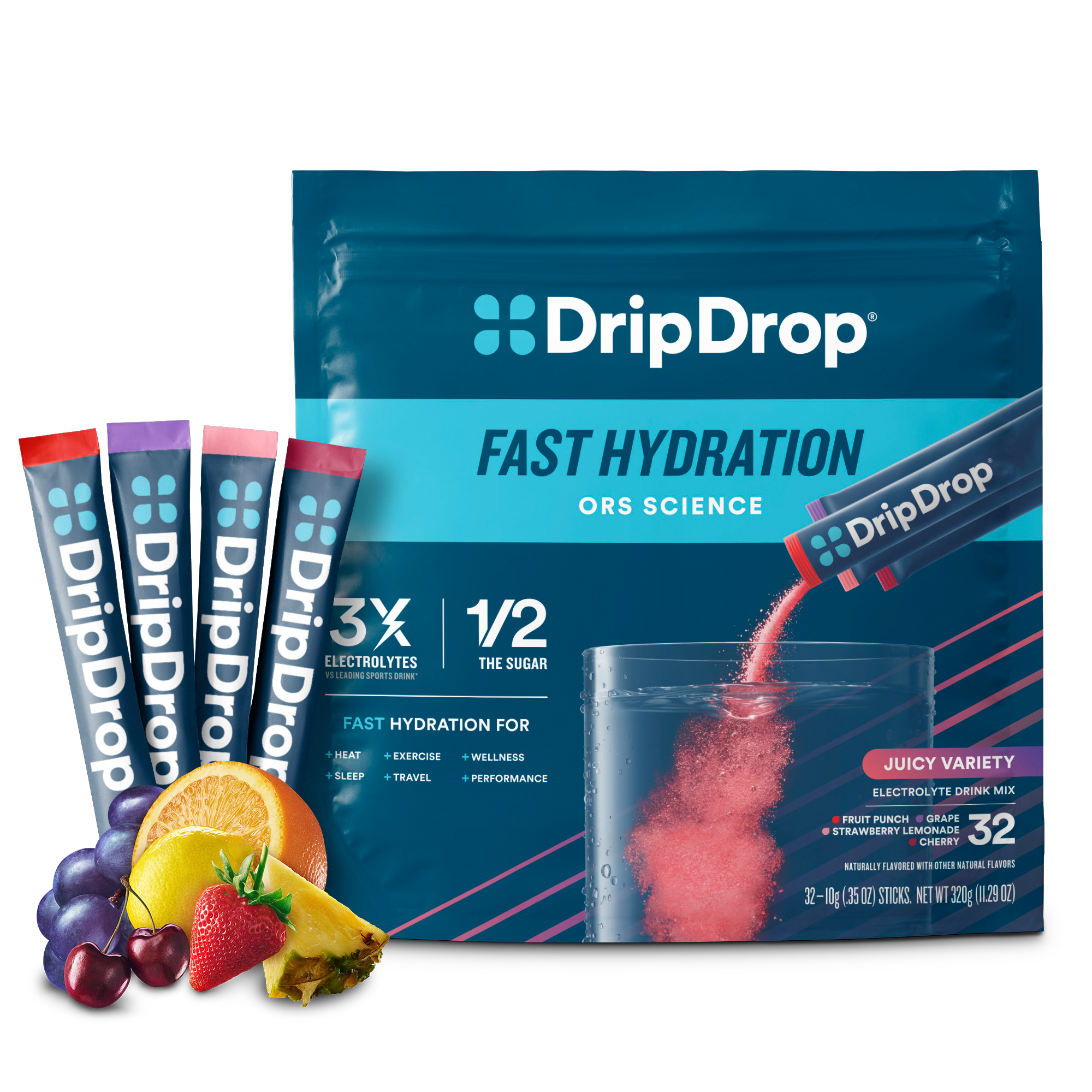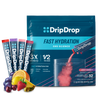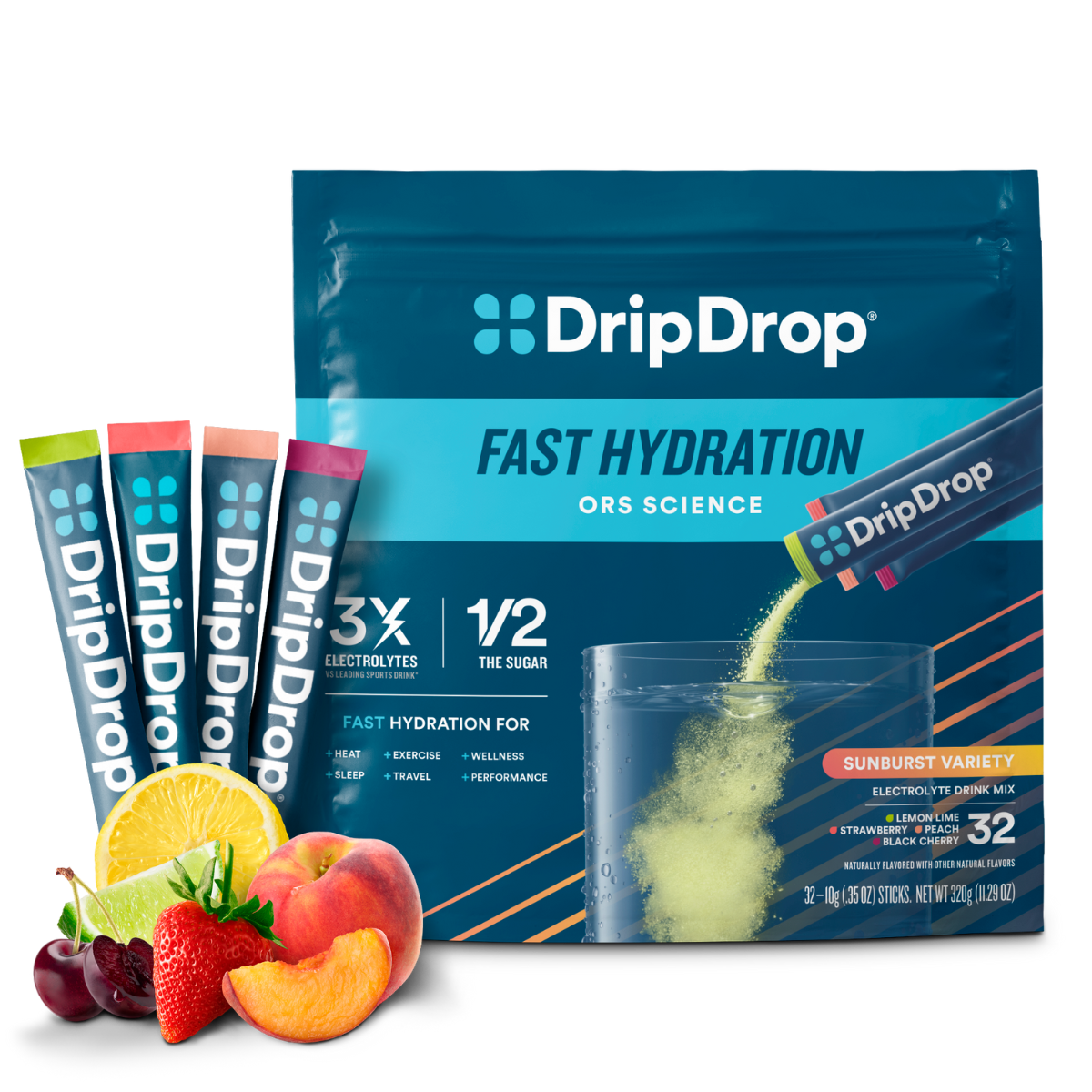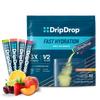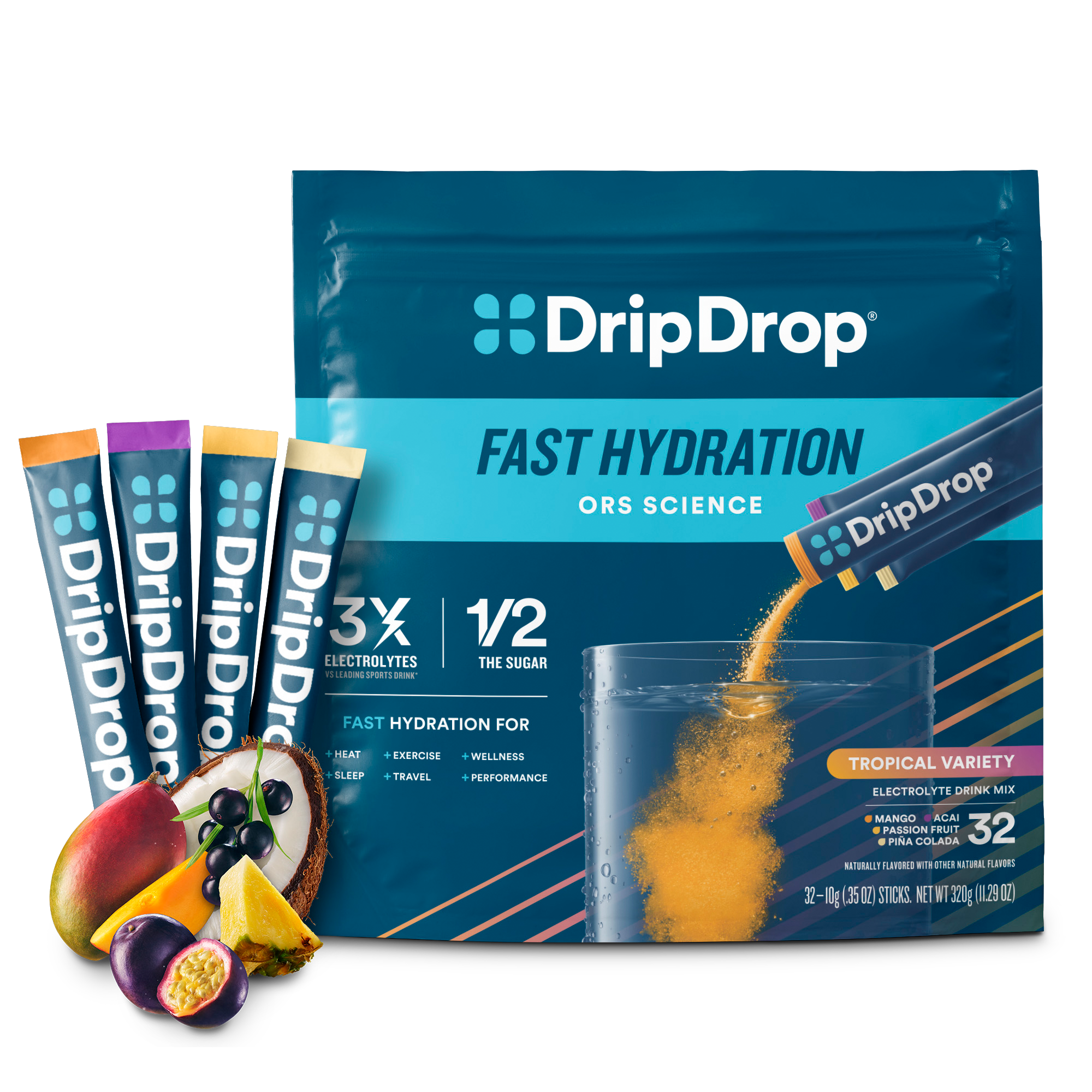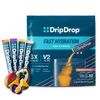Millions of Americans start their morning with a piping hot cup of coffee. It can give you that extra energy boost and make for a tasty drink with breakfast. Some people may even enjoy several cups throughout the day.
Coffee is so widely loved in the U.S. that 70% of adults drink coffee every week, and 62% drink it every day, according to the National Coffee Association. But, it can be concerning when you read articles about or hear people discussing the dehydrating effects of coffee. Most agree that coffee certainly doesn’t hydrate us the way water and other drinks might, but don’t dump your fresh pot of coffee down the drain yet.
If you’ve been wondering, “Does coffee dehydrate you?” we have the answers. We’ll dive into the latest research on how caffeine affects hydration and how to keep yourself hydrated throughout the day with electrolyte drink mix DripDrop. Adding this delicious fast-hydrating powder developed based on oral rehydration solution science helps your body get the fluids and electrolytes it needs to function at its best.
How Does Coffee Impact Hydration?
Researchers in the U.S. have long been exploring the impact of coffee on humans’ hydration levels, and the results have been relatively conclusive. The question “does coffee dehydrate you” stems from the fact that caffeine — the main active ingredient in coffee — is a diuretic, which means it can have a dehydrating effect. Diuretics, like caffeine, can increase the frequency of urination, causing you to lose more fluids than you’re taking in, which produces symptoms of dehydration.
This answer seems simple, but there’s actually more behind the question: Does coffee dehydrate you?
Studies show caffeinated beverages, in moderation, aren’t likely to cause dehydration. The U.S. Food and Drug Administration (FDA) recommends limiting daily caffeine intake to 400 mg, equivalent to about four or five cups of coffee.
However, drinking large amounts of coffee daily combined with more strenuous activities such as exercising or spending a lot of time outside on a hot day can increase the chance of dehydration.
Coffee lovers don’t need to cut java out of their daily routine completely. Still, limiting your caffeine intake and enjoying hydrating beverages like electrolyte drink mix DripDrop can boost your hydration levels and keep dehydration at bay. DripDrop was developed by a doctor to create a delicious and fast-hydrating solution that provides a boost of electrolytes your body can’t get from water alone. Integrating one DripDrop packet a day into your water can help your body remain hydrated and healthy all day long.
Does Coffee Count as Water Intake?
When consumed in moderation, coffee actually can count towards your daily water intake. Though many believe caffeinated beverages lead to dehydration, studies show little evidence of caffeine causing dehydration. After all, a cup of coffee is made almost entirely of water filtered through tasty roasted coffee beans. In fact, other popular caffeinated drinks, like green tea and black tea, all count towards your daily fluid intake.
But it’s essential to remember that caffeine is a diuretic, so you must make sure you still drink plenty of water and consume foods and drinks like DripDrop with electrolytes to help your body function properly.
A 2014 counterbalanced crossover study published in PLOS ONE examined the effects of coffee drinking on hydration. It found that moderate levels of coffee can actually provide “similar hydrating qualities to water." However, drinking large amounts of coffee or pairing moderate coffee intake with other intense activities that cause excessive sweating can still compound the risk of dehydration.
In another study at the University of Birmingham, researchers looked at hydration levels in 50 men who regularly drank three to six cups of coffee per day in two phases. In the first, coffee was their primary source of fluids. Then, they gave up coffee and replaced it with an equal amount of water.
The results: Participants didn’t experience differences in hydration levels, and research didn’t find evidence of dehydration. This may have been a result of having developed a tolerance. Yet the study was an example of research that has debunked the coffee-dehydration myth.
In fact, the Institute of Medicine concluded in its 2004 Dietary Reference Indexes report that caffeinated drinks can contribute to daily water needs as well because the diuretic effect is minimal. Bottom line: The answer to “does coffee dehydrate you” is a bit more complicated than we thought, but with proper hydration and limiting your caffeine intake, coffee alone shouldn’t cause dehydration.
Symptoms of Dehydration
Dehydration is a condition in which water and electrolyte loss is greater than intake. It can cause a variety of symptoms, from extreme thirst to painful headaches and uncomfortable dizziness. In severe cases, it can be deadly.
Coffee’s diuretic effect, combined with other issues like sweating and illness, can increase the risk of dehydration. For example, when you sweat, your body excretes water and salts to the surface of your skin. There, it evaporates to create a cooling effect. If you don’t replace those lost fluids and electrolytes quickly, dehydration occurs.
Illnesses like diarrhea and vomiting also cause rapid fluid loss, heightening the likelihood of dehydration. If you’re experiencing either of these symptoms while sick, it’s best to avoid caffeine even if you feel like you need a little boost. Reach for a glass of water instead and add a DripDrip packet to help you hydrate fast and replace much-needed electrolytes.
Other common causes of dehydration include certain medical conditions — such as diabetes, cystic fibrosis, and kidney disease — and medications like beta-blockers.
It’s important to know the signs of dehydration so you can act quickly when they appear.
Here are some common dehydration symptoms:
-
Extreme thirst and parched mouth
-
Headache
-
Dizziness
-
Lightheadedness and fatigue
-
Low blood pressure
-
Dry skin
-
Sunken eyes
If you’re ill, exposed to extreme temperatures, or otherwise notice signs of dehydration, you may want to decrease your caffeine intake, as caffeine dehydration is a possibility.
The best way to avoid caffeine dehydration is to make sure you get the right amount of fluids and electrolytes. While many experts recommend drinking eight 8-ounce cups of water a day, the recommended daily fluid intake varies from person to person. Your body weight, activity level, and medical condition can all affect the amount of fluids you need.
If you’re unsure of how much water and electrolytes you need to drink each day, consult a healthcare professional or registered dietitian. They can assess your medical history and help determine what your body needs.
Stay Hydrated with DripDrop
So, does coffee dehydrate you? A few cups of coffee will not cause dehydration, and coffee does count toward your daily water intake. But, drinking large amounts of caffeine can have a diuretic effect, leading to dehydration. To avoid this problem, build routine water-drinking habits to make sure you’re getting the right amount of fluids every day.
However, drinking water isn’t enough to keep you functioning at your best. Your body requires electrolytes to run bodily systems and processes. DripDrop is specifically formulated with electrolytes you need like zinc, potassium, and magnesium, in addition to the perfect balance of sodium and glucose to help your body absorb water and electrolyte fast.



